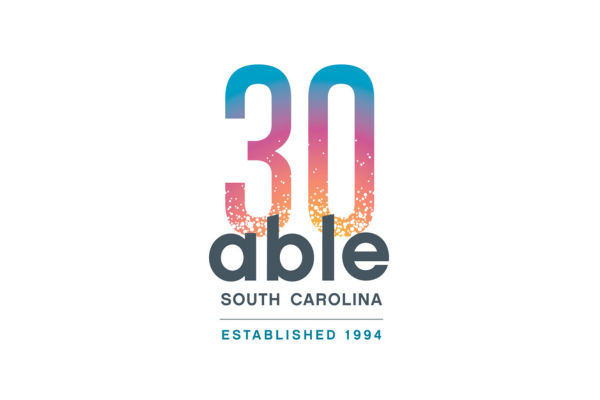By Able SC
A few weeks ago the Americans with Disabilities Act (ADA) celebrated its 34th birthday. The ADA remains the landmark legislation that, when signed, President George Bush proclaimed, “let this shameful wall of exclusion finally come tumbling down.” Since then, tremendous strides have been made allowing individuals with disabilities to have an equal opportunity to experience our shared community on our terms.

However, progress is not equal, and for many, inclusion is still a long way off. In a 2022 South Carolina statewide needs assessment, individuals with disabilities identified public perception – or what others believe we can or should do – as the primary barrier to community inclusion. These entirely artificial barriers represent themselves through the policies and practices we implement across our organizations and those from our General Assembly, as well as how we address the state’s most pressing challenges.
Today, 1 of 3 individuals in the state has an existing disability. We remain the largest minority in the nation and the only one where membership is open throughout the life cycle. Despite our prevalence, we continually have to ensure that basic rights and protections are available. Even gaining an accurate count of our community is a challenge as disability status is not included in the current state or national Kids Count rankings.
While we know the total number of South Carolina children receiving educational services through the Individuals with Education Act and specialized instruction is over 100,000, data is not reported on how many children with disabilities are receiving supportive services through Section 504 of the Rehabilitation Act. Absent an accurate count of students served, we are left unsure of the prevalence and, thus, the impact of disability on educational access. This past year, advocates from across the country fought against efforts from the U.S. Census Bureau, which would have lowered the disability count in the country by 40%. As Kids Count advocates are aware, the areas that are counted are the areas that are addressed. This means that children with disabilities are often not accurately represented in education, child welfare, health, and other public-serving systems. This lack of focused attention leads to services/programs not designed for the population and can even harm their approach.
The barriers are real, grounded in policy and practice, but most prominently present in the daily practices that limit inclusion and equity across our communities.
Through coordinated efforts, progress has come to South Carolina. In recent years, Able SC-led efforts have ensured the right for individuals with disabilities to parent absent a threat of DSS interaction solely based on a parent’s disability (2017); becoming the 13th state – and the first in the South – to ban the abysmal practice of paying individuals with disabilities less than a minimum wage in a workplace (2022). Most recently, Governor McMaster signed legislation broadening the availability of the childcare workforce, providing greater opportunities for individuals with disabilities.
And yet, much, much more remains. Recent updates to federal regulations call for ensuring that child welfare, health, and other public agencies promote broader disability awareness. Other rules call for broader digital accessibility across all entities receiving public funds. From our experience, agencies and workers have vastly different knowledge and awareness about services designed for individuals with disabilities. Few foster homes have appropriate accommodations to support a child with disabilities, foster parents have a varied knowledge of children with disabilities, and evidence-based prevention efforts (including home visitation services) rarely take into account children with disabilities in their practices.
So, what can we do next? Our approaches are simple. They are straightforward and broadly vetted through practitioners, researchers, elected officials, and most importantly – the disability community themselves. These approaches address the areas identified by the community and are shared annually during the Advocacy Day for Access and Independence, a coalition of nearly 50 organizations.
When the General Assembly returns in January, step one should be to advance on stalled, bipartisan efforts for broad health care reform. This effort immediately addresses a state health approach identified as “the only state where health and human services-related departments are independent of one another without common oversight by the governor. This has led to a lack of cohesive strategy for populations, gaps in available care, and challenges for constituents to navigate the system.” Adopting this legislation provides the path for clarity and alignment among a centralized healthcare entity and, more significantly, from our view, provides a state-level Director of Community Integration to oversee service delivery for individuals with disabilities.
Once adopted, other state agencies should follow this lead and simply comply with existing federal law by appointing a dedicated ADA Coordinator. This oversight from most state agencies means the needs, concerns, and opportunities of individuals with disabilities are once again regulated as an afterthought.
The areas we have not talked about are just as equally present in our daily lives, including transportation, shared access to employment, affordable and accessible housing, and much more. As we collectively seek to overcome our greatest barrier – community perception – we welcome the opportunity to work alongside anyone willing to stand with us. You, too, might join as a member at any time.
Able SC is a disability-led organization seeking transformational changes in systems, communities, and individuals. Since 1994, we’ve remained a consumer-controlled, community-based, cross-disability nonprofit that seeks to make South Carolina a national model of equity and inclusion for all people with disabilities.
